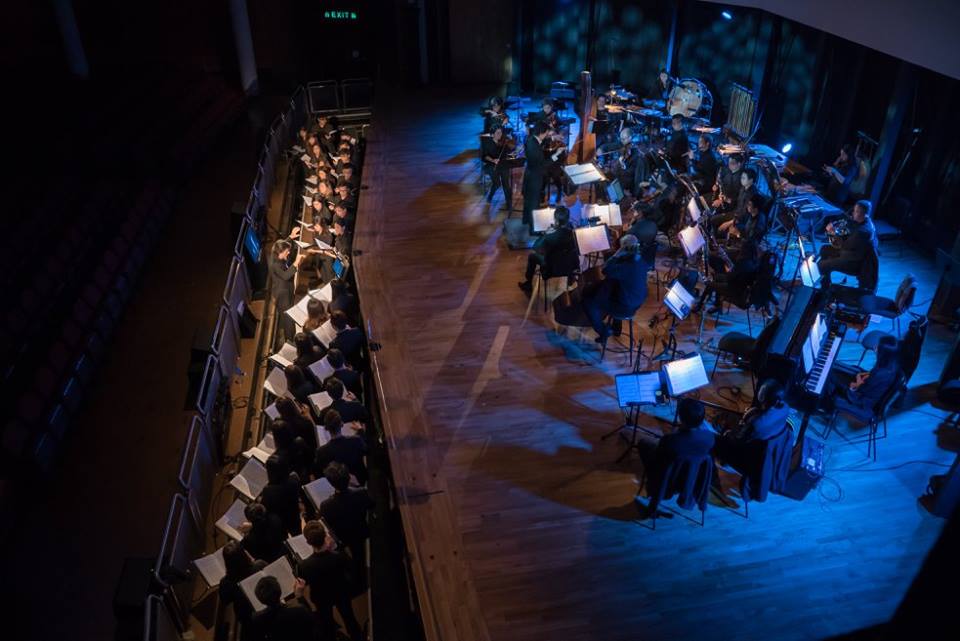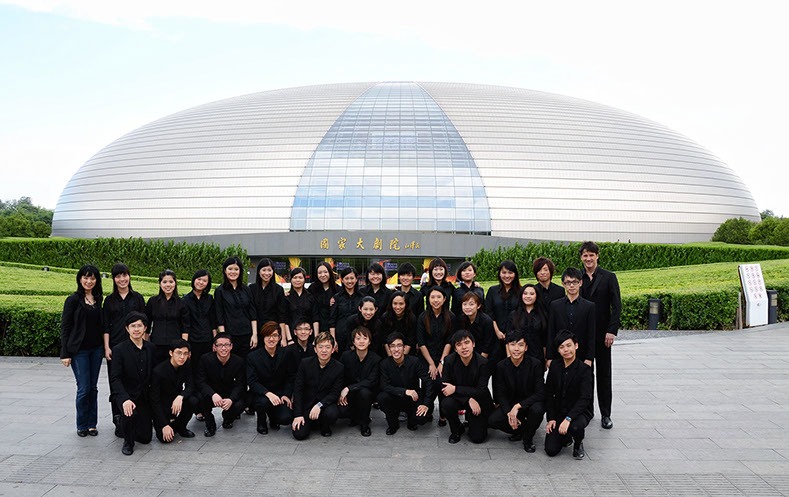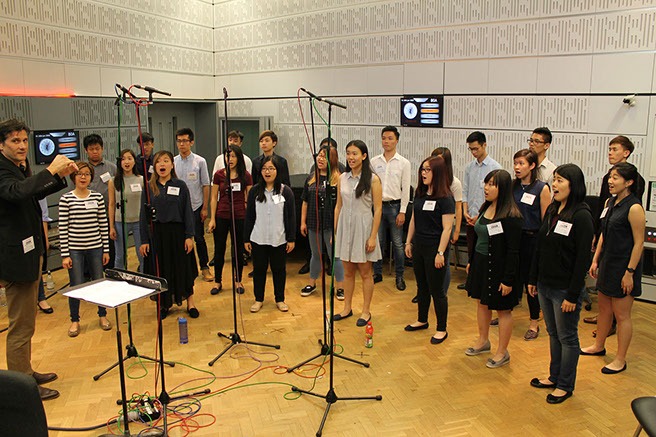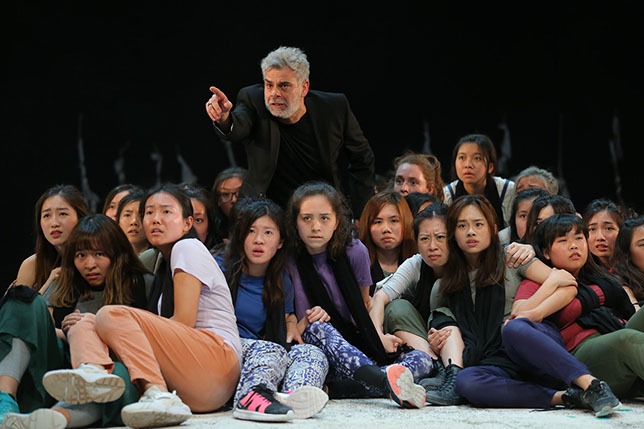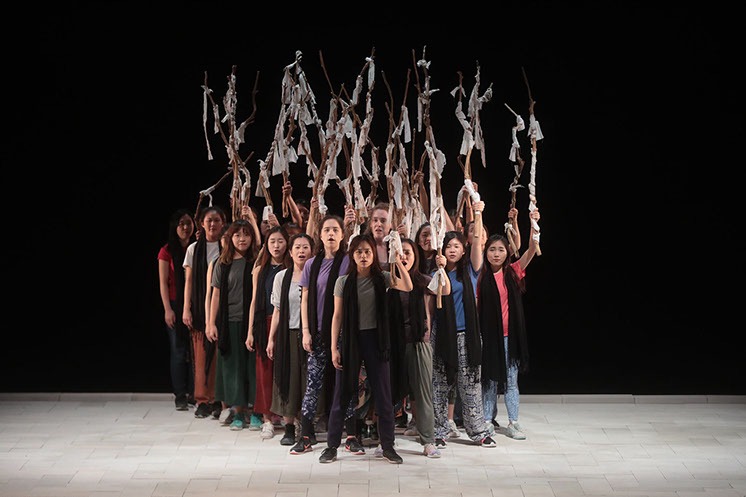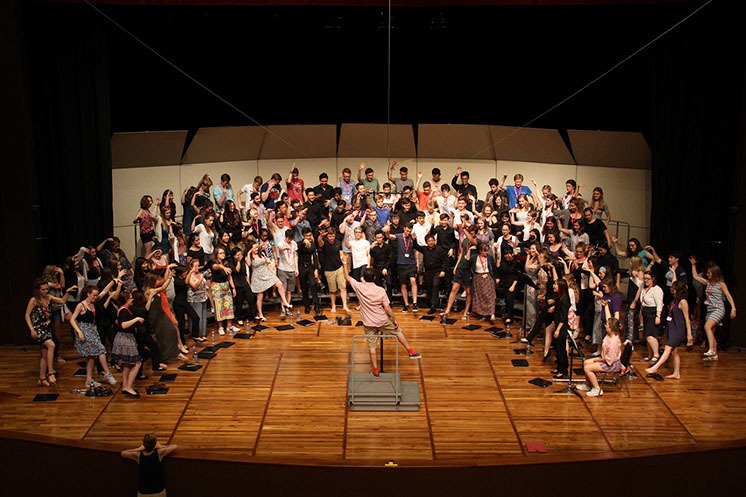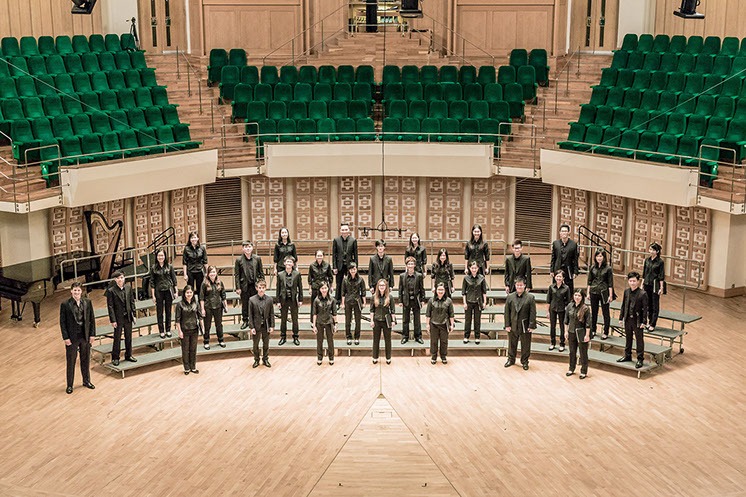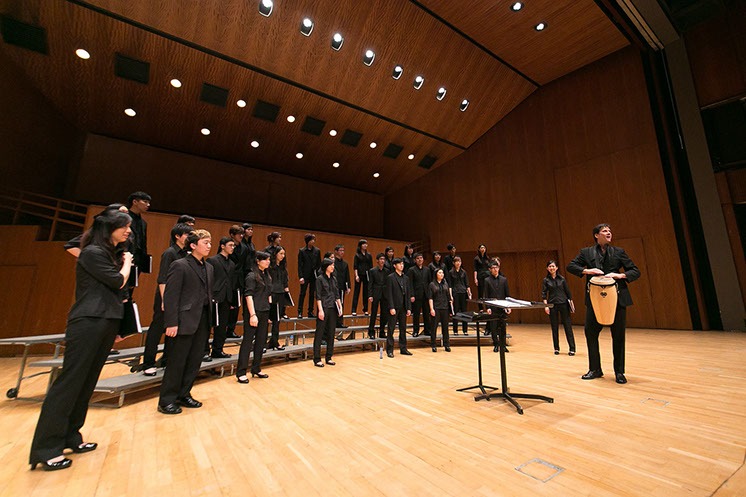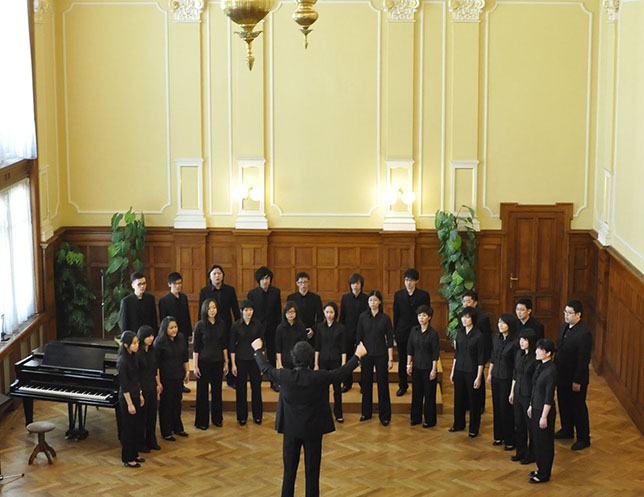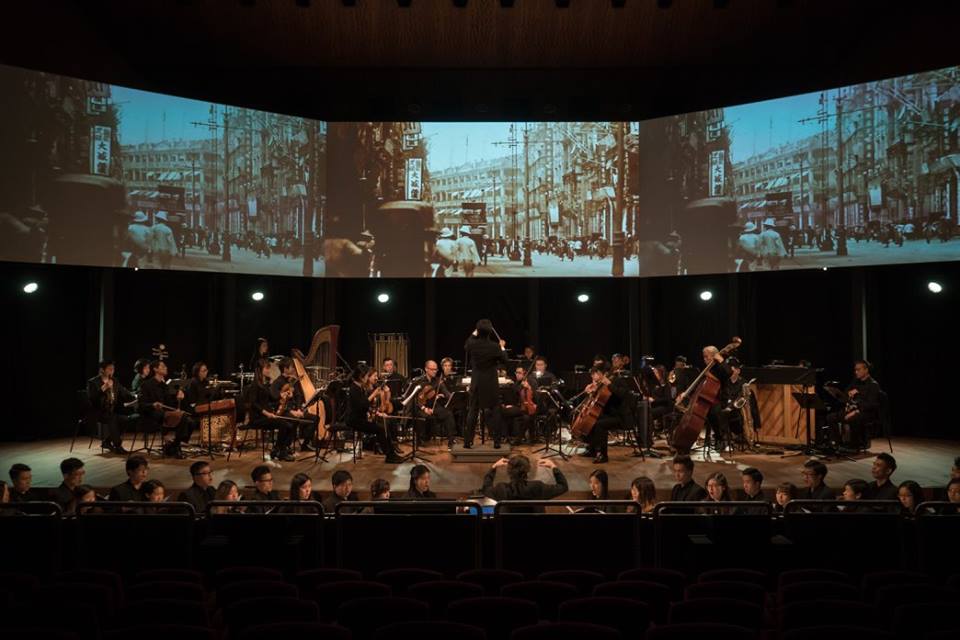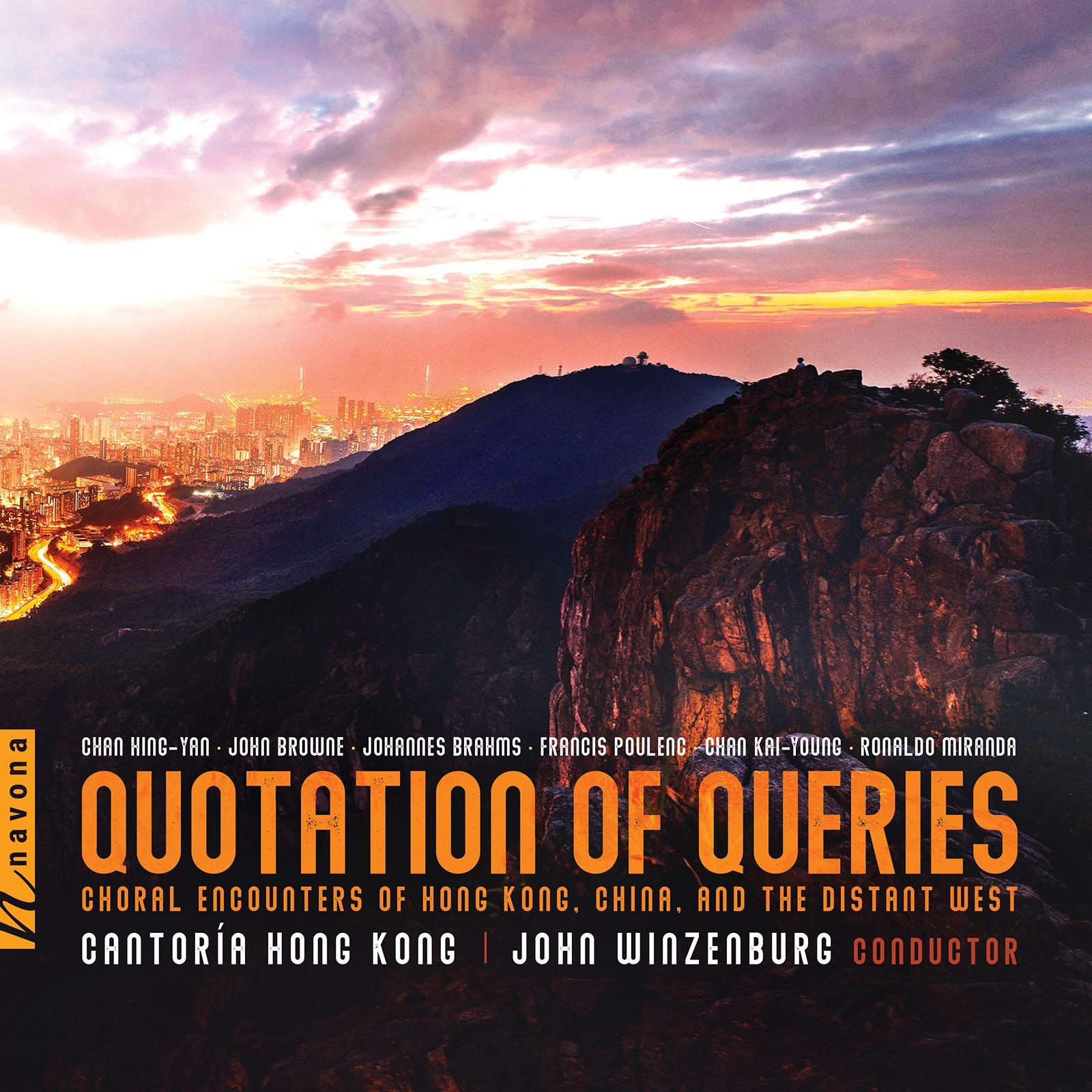
Share Album:
Quotation of Queries
Chan Hing-Yan composer
John Browne composer
Johannes Brahms composer
Francis Poulenc composer
Chan Kai-Young composer
Ronaldo Miranda composer
Cantoría Hong Kong | John Winzenburg conductor
Fresh from Navona Records comes QUOTATION OF QUERIES, featuring the students of Hong Kong Baptist University under the direction of Professor John Winzenburg. This collection of choral music explores notions of culture throughout the course of human civilization. It features traditional compositions, recent works, and even three debut recordings by prominent composers from Hong Kong and the United Kingdom.
The album opens with “Prelude,” the first movement of Quotation of Queries by composer Chan Hing-Yan. We hear the knocking of a piano, and the sudden, vigorous vocalizations of the Cantoría Hong Kong. The music, which is set to classical Mandarin poetry, pairs Chinese folk traditions with dissonant modern sonorities. The translations of these “queries” include “What do you think human life is like here or there?” and “When can I just ignore the encumbrance?” Next comes John Browne’s setting of Aeschylus’s The Suppliant Woman, which borrows from both classical Greek drama as well as modern theater, with the chorus assuming the role of the story’s protagonist. Later on, we hear excerpts from Brahms’s 11 Zigeunerlieder (Gypsy-Songs), Op. 103, which offers a 19th century take on the challenge of blending of cultures through music. These are just a sampling of the album’s stylistic range.
Those who listen to QUOTATION OF QUERIES will find themselves immersed in a deep pool of cultural and musical traditions, as curated by Professor John Winzenburg. These recorded expressions of powerful emotion told through a myriad of musical scales and languages, perhaps counterintuitively, confront the listener with our common humanity across time and space. Listeners should be warned, however, that they too may be left with more questions than answers.
Listen
Stream/Buy
Choose your platform
Track Listing & Credits
| # | Title | Composer | Performer | |
|---|---|---|---|---|
| 01 | Quotation of Queries: I. Prelude | Chan Hing-Yan | Chan Yan Yi Crystal, piano | 1:53 |
| 02 | Quotation of Queries: II. The Hermit | Chan Hing-Yan | Chan Yan Yi Crystal, piano | 1:52 |
| 03 | Quotation of Queries: III. Huanyi's Three Farewell Tunes | Chan Hing-Yan | Chan Yan Yi Crystal, piano | 2:03 |
| 04 | Quotation of Queries: IV. Who Says That Dongpo Is Old | Chan Hing-Yan | Chan Yan Yi Crystal, piano | 2:53 |
| 05 | Quotation of Queries: V. Ignore the Encumbrance | Chan Hing-Yan | Chan Yan Yi Crystal, piano | 5:08 |
| 06 | The Suppliant Women (Excerpts): Parados | John Browne | John Winzenburg, Egyptian Herald; Ben Burton, percussion; Callum Armstrong, aulos | 3:46 |
| 07 | The Suppliant Women (Excerpts): Ode 2 | John Browne | John Winzenburg, Egyptian Herald; Ben Burton, percussion; Callum Armstrong, aulos | 5:50 |
| 08 | The Suppliant Women (Excerpts): Ode 3 | John Browne | John Winzenburg, Egyptian Herald; Ben Burton, percussion; Callum Armstrong, aulos | 5:05 |
| 09 | The Suppliant Women (Excerpts): 3rd Amoibaion | John Browne | John Winzenburg, Egyptian Herald; Ben Burton, percussion; Callum Armstrong, aulos | 5:00 |
| 10 | The Suppliant Women (Excerpts): Exodus | John Browne | John Winzenburg, Egyptian Herald; Ben Burton, percussion; Callum Armstrong, aulos | 3:41 |
| 11 | Zigeunerlieder, Op. 103 (Excerpts): No. 1, He, Zigeuner, greife in die Saiten ein | Johannes Brahms | Lai Pui Sang, piano; Chu Cho Hang, tenor solo; Lau Cheuk Ying, soprano solo; Chan Wing Yan, soprano solo | 1:28 |
| 12 | Zigeunerlieder, Op. 103 (Excerpts): No. 7, Kommt dir manchmal in den Sinn | Johannes Brahms | Lai Pui Sang, piano; Chu Cho Hang, tenor solo; Lau Cheuk Ying, soprano solo; Chan Wing Yan, soprano solo | 1:32 |
| 13 | Zigeunerlieder, Op. 103 (Excerpts): No. 8, Horch, der Wind klagt in den Zweigen | Johannes Brahms | Lai Pui Sang, piano; Chu Cho Hang, tenor solo; Lau Cheuk Ying, soprano solo; Chan Wing Yan, soprano solo | 1:28 |
| 14 | Zigeunerlieder, Op. 103 (Excerpts): No. 5, Brauner Bursche führt zum Tanze | Johannes Brahms | Lai Pui Sang, piano; Chu Cho Hang, tenor solo; Lau Cheuk Ying, soprano solo; Chan Wing Yan, soprano solo | 1:15 |
| 15 | 8 Chansons françaises, FP 130 (Excerpts): No. 1, Margoton va t'a l'iau | Francis Poulenc | Chan Wing Yan, soprano solo; Cheng Man Wai, bass solo | 2:37 |
| 16 | 8 Chansons françaises, FP 130 (Excerpts): No. 2, La belle se siet au pied de la tour | Francis Poulenc | Chan Wing Yan, soprano solo; Cheng Man Wai, bass solo | 1:29 |
| 17 | 8 Chansons françaises, FP 130 (Excerpts): No. 3, Pilons l'orge | Francis Poulenc | Chan Wing Yan, soprano solo; Cheng Man Wai, bass solo | 0:48 |
| 18 | 8 Chansons françaises, FP 130 (Excerpts): No. 4, Clic, clac, dancez sabots | Francis Poulenc | Chan Wing Yan, soprano solo; Cheng Man Wai, bass solo | 2:14 |
| 19 | 8 Chansons françaises, FP 130 (Excerpts): No. 8, Les tisserands | Francis Poulenc | Chan Wing Yan, soprano solo; Cheng Man Wai, bass solo | 1:44 |
| 20 | 2 Cantonese Works: I. Under the Mid-Autumn Moon | Chan Kai-Young | Tsang Chiu In, piano | 3:36 |
| 21 | 2 Cantonese Works: II. The Crane Releasing Pavilion | Chan Kai-Young | Tsang Chiu In, piano | 3:07 |
| 22 | Suite Nordestina: I. Morena bonita | Ronaldo Miranda | Cheng Man Wai, bass solo | 0:51 |
| 23 | Suite Nordestina: II. Dendê trapiá | Ronaldo Miranda | Cheng Man Wai, bass solo | 1:07 |
| 24 | Suite Nordestina: III. Bumba chora | Ronaldo Miranda | Cheng Man Wai, bass solo | 2:19 |
| 25 | Suite Nordestina: IV. Eu vou, eu vou | Ronaldo Miranda | Cheng Man Wai, bass solo | 0:53 |
Quotation of Queries
Text by Su Dongpo (Su Shi, 1037–1101)
The Suppliant Women (Excerpts)
Text by Aeschylus (525-456 BC), adapted by David Greig
Zigeunerlieder, Op. 103 (Excerpts)
Text adapted from Hungarian by Hugo Conrat (1845-1906)
2 Cantonese Works
Text by Su Dongpo (Su Shi, 1037–1101)
All tracks recorded June 11-16, 2018 at Studio 28 in Bangkok, Thailand
Recording Session Producer Sathapat Sangsuwan
Recording Session Engineer, Mixing, Mastering Jake Craig
CANTORÍA HONG KONG
SOPRANO-ALTO
Chan Ka Wing
Chan Sze Ka
Chan Wing Yan
Chan Yan Yi Crystal
Chau Hoi Lee
Cheung Ka Hei Sabrina
Got On Yin
Lai Cho Lam Claudia
Lam Yuet Kay
Lau Cheuk Ying
Leung Hin Yan
Leung Wai In
Lo Wai Man
Tsang Cheuk Lam Chalene
Tsang Chiu In
Wong Cho Ying
Wong Yi Ching Ariel
Wu Wing Shan Sandy
Yip Hei Tung
Yip Ka Hing
Yuen Ka Wai
TENOR-BASS
Cheng Man Wai
Cheung Pak Sang
Choy Long Hin
Chu Cho Hang
Fung Ka Yiu Banny
Kam Ka Yiu
Lai Pui Sang
Lam Ho Yan Dominic*
Lam Lok
Lee Ka Lun
Man Pak Yue
Tang Tsz Ngo Geoffrey
Tsang Lok Ki
Tse Kai Tik Declan
Yan Zijie
*Assistant Conductor
Executive Producer Bob Lord
Executive A&R Sam Renshaw
A&R Director Brandon MacNeil
A&R Morgan Santos
VP, Audio Production Jeff LeRoy
Audio Director Lucas Paquette
VP, Design & Marketing Brett Picknell
Art Director Ryan Harrison
Design Edward A. Fleming
Publicity Patrick Niland, Sara Warner
Artist Information

John Winzenburg
John Winzenburg is a professor of music at Hong Kong Baptist University, where he conducts the Cantoría Hong Kong. He and the Cantoría have actively promoted Chinese choral music in dialogue with international repertoire since they first earned a Gold Medal at the Czech 2010 Festival of Songs Olomouc and they presented a Weekend Concert at the National Centre for Performing Arts in Beijing in 2012. Winzenburg performed as Choral Director of the premiere of Hong Kong Odyssey at the 2017 Hong Kong Arts Festival and served as Chorus Master of The Suppliant Women in collaboration with the Actors Touring Company (UK) and the Royal Lyceum Theatre Edinburgh at the 2018 Hong Kong Arts Festival.
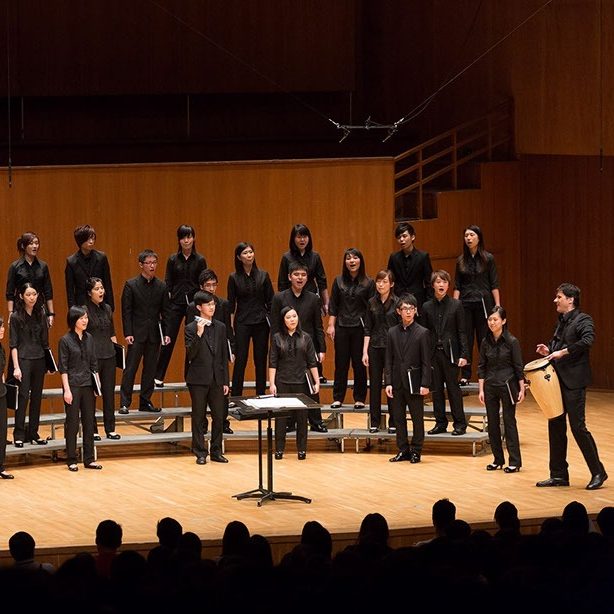
Cantoría Hong Kong
CANTORÍA HONG KONG is a mixed choir of select students from the HKBU Department of Music. The group was established in September 2009 and traveled to the Czech Republic in June of the following year to participate in the 2010 Festival of Songs Olomouc, where it was awarded a Gold Medal in the category for chamber choirs.
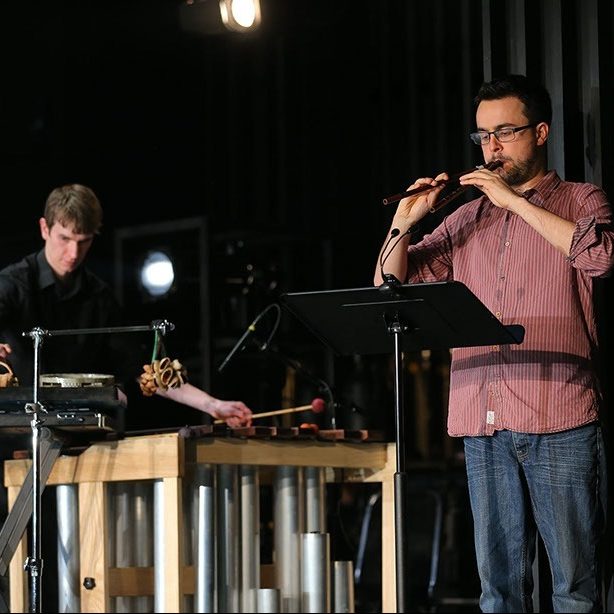
Ben Burton
Ben Burton trained at the Royal Academy of Music in London and, since 2016, he has toured regularly as percussionist with the Actors Touring Company’s revival of The Suppliant Women. Burton has also performed and recorded with renowned ensembles at major venues in the United Kingdom, and he has worked with many acclaimed conductors, including Sir Mark Elder, Marin Alsop, and Edward Gardner.
Callum Armstrong
Callum Armstrong trained at Trinity Laban Conservatoire of Music and Dance in London and in 2016 became involved in the Actors Touring Company production of The Suppliant Women, in which he played the ancient double-reed, double-pipe aulos. Armstrong has won numerous piping and recorder prizes, and he has performed as soloist with the London Philharmonic Orchestra and in Steven Spielberg’s film Warhorse.
John Browne
John Browne trained at University College Cork with Gerald Barry and at the Manhattan School of Music in New York on a Fulbright Award. His opera credits include Babette’s Feast, Demon Juice (Royal Opera House); Early Earth Operas, Midnight’s Children (English National Opera); and A Nightingale Sang (Southbank Centre).
Chan Hing-Yan
Chan Hing-Yan is currently James Chen and Yuen-Han Chan Professor in Music at the University of Hong Kong. Lauded for their subtle mediation between Chinese elements and Western idioms, Chan’s compositions have been heard around the world at prestigious festivals. Recent works include three chamber operas (2018, 2015, 2013).
Chan Kai-Young
Chan Kai-Young often assimilates various Asian cultural traditions into his music, and he is particularly drawn to the musicality of Chinese literature expressed through the tonal Cantonese language. His music is performed in various continents by the Pittsburgh Symphony Orchestra, Albany Symphony, Hong Kong Philharmonic Orchestra, Hong Kong Sinfonietta, PRISM Quartet, Daedalus Quartet, and Mivos Quartet, among other prominent performers.
Ronaldo Miranda
Ronaldo Miranda was born in 1948 in Rio de Janeiro, Brazil. He holds graduate and undergraduate degrees in Piano and Composition from the Universidade Federal do Rio de Janeiro and the Universidade de São Paulo. In 1974, Miranda started his professional career as a music critic for the Jornal do Brasil, a well-known newspaper from Rio.
Notes
QUOTATION OF QUERIES: CHORAL ENCOUNTERS OF HONG KONG, CHINA, AND THE DISTANT WEST explores selective cultures, eras, and texts of human civilization through the international choral medium that grew out of Western art music. This album, however, adopts the perspective of a Hong Kong music ensemble looking outward in space and time: through choral encounters with traditions near, far, and into the distant past. Following the spirit of the album’s title track, which explores the nature of life via the ancient writings of one of China’s most celebrated poets, the Cantoría poses its own set of choral queries in six languages from the cultural crossroads of Hong Kong:
- How do texts of the ancient world find meaning through choral music in our contemporary life of the 21st century?
- How do traditions of classical poetry, Greek theater, Hungarian-inspired German Romanticism, French chansons, and Brazilian folk forms merge onto a contemporary choral platform?
- How are tonal Chinese languages of Mandarin and Cantonese enunciated chorally alongside non-tonal Western languages of English, German, French, and Brazilian-Portuguese?
- How do advancing media technologies transform Asian university ensemble practices when cross-cultural choral works are premiered in Hong Kong, recorded in Bangkok, and released on a U.S.-global digital platform?
- How does the view from Hong Kong both include us in and distinguish us from traditions of different continents?
The album also captures the spirit of Hong Kong multiculturalism, which has a distinctive face of diversity from that celebrated among the world’s Anglophone countries. Hong Kong might be regarded as a “double multicultural” territory: As a Special Administrative Region of China, it is officially trilingual (Cantonese, Mandarin, and English), bringing together local, national, and post-colonial identities as an outgrowth of its Chinese-Western history; as an international, ethnically diverse urban center, it also has a growing interest in learning about “world music” and cultures.
The selection of traditions being represented chorally in this project, while not carrying an obvious immediate interconnection, nonetheless has its own underlying logic: Hong Kong’s unparalleled historical development has made it necessary for university student ensembles of the early 21st Century to bridge Chinese, Asian, Western, and global cultures like nowhere else. Student members of the Cantoría are trained in Western music as a central part of their “own” tradition from an early age, and yet they contribute to Hong Kong-Chinese choral development with new works performed in Mandarin and Cantonese that are distinctive from those composed elsewhere in China.
At the same time, Hong Kong’s status as an international travel and financial center provides the group with unique collaborative opportunities like that in The Suppliant Women, while the inclusion of international university faculty at Hong Kong institutions – in this case an American faculty-conductor long trained in modern Asian languages and international musical forms – brings the need for contemporary world choral music. This is to say that, although the specific combination of traditions captured in this album may not have been inevitable, they embody a fundamental interaction of Chinese-Western-global that is inherent to the Hong Kong locale and is continuously cultivated in ensemble programming.
The album’s subtitle Choral Encounters of Hong Kong, China, and the Distant West, then, from the standpoint of the Cantoría, describes a musical condition that is simultaneously aligned with yet distanced from all the traditions it experiences, including Cantonese choral expression that is relatively new to the members. Put another way, in the Hong Kong soundscape, all forms of choral repertoire are embraced with limitations, and the most familiar Western form is at least partly experienced from the outside, never fully internalized.
This collection features recent works, including three choral recording premieres, by prominent composers from Hong Kong, Brazil, and the United Kingdom. Not only does it intersect cultures and historical eras, it also presents a rare combination of styles and genres in a single choral setting. The two sets of Chinese texts on this album are set to classical poetry, which is a testament to the high status that literature holds in Chinese culture. Chan Hing-Yan’s work is scored for a choral-piano duo mixing Chinese folk and dissonant modern sonorities, but where the extended piano techniques themselves play multiple musical roles. The two accompanied Cantonese works by Chan Kai-Young are in an accessible, contemporary choral language that also typifies popular Hong Kong music, but where piano gestures reflect aspects of traditional Chinese instrumental music. John Browne’s Suppliant Women score combines elements of ancient Greek drama with contemporary choral theatre, as the chorus assumes the role of group protagonist in a novel partnership with percussion and the ancient aulos – the successful reproduction of the obscure reed instrument by Callum Armstrong facilitated the rediscovery of the Greek choral form in a 21st-century format. The unaccompanied Suíte Nordestina captures folk idioms of Brazil that are themselves amalgams of South American, African, and Portuguese forms, in which the voices sing intertwining melodies and imitate percussion instruments.
Older German and French works of the Western choral canon also figure into this collection, as they serve core pedagogical functions to Hong Kong university music majors yet emanate from cultural contexts that are perceived as “foreign” to most Cantoría members. The Brahms Zigeunerlieder were conceived as an accompanied part-song cycle for solo quartet and, in 19th-century Viennese society, were prized for their symbolic blending of uninhibited exotic culture and Western art music. If Hungarian Gypsy music was once seen as “oriental” in the eyes of Western Europe, it is surely just as much exotic “other” to the Hong Kong choral ensemble. Poulenc’s chansons cycle for unaccompanied choir, in its clever bucolic setting, is equally esoteric to Hong Kong tertiary students as a social commentary of French folk life, even if it serves as a familiar musical vehicle for learning lyric diction. The album presented here thus offers a two-directional glimpse at the eclectic musical texts: from Hong Kong, we peer back toward the Chinese and non-Chinese origins of our composite worldview; from elsewhere, we observe the cosmopolitan “fragrant harbor” through a new choral-cultural lens.
— John Winzenburg
Videos
Cantoria Hong Kong & National Youth Choir of Great Britain - Selections from Half Moon Rising
National Youth Choir of Great Britain & Cantoria Hong Kong - Star of the County Down, Arr. Ben Parry
Cantoria Hong Kong - 水光瀲灩 Shui Guang Lian Yan (Ripples Glisten Away . . .)
Cantoria Hong Kong - Gibbons, Magnificat & Nunc Dimittis from The Short Service
